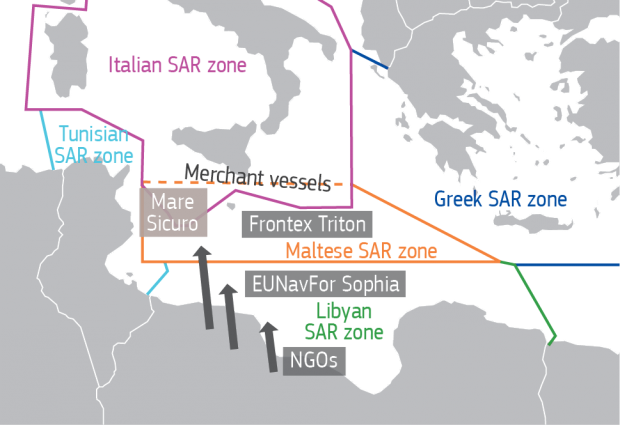When interests intersect, unlikely alliances arise. An increasing number of reports indicate that non-governmental organizations are collaborating with human traffickers to illegally transport migrants into Europe, undocumented and unchecked. Credible sources, ranging from the BBC to the EU’s own border protection agency, Frontex, have reported on what appears to be active collusion between these two groups to aid and abet illegal immigration and human trafficking.
Last weekend, the BBC ran a story citing claims from an Italian prosecutor, Carmelo Zuccaro, that migration-supporting NGOs are actively cooperating with human traffickers to assist in transporting migrants from the shores of Libya to Europe.
According to the prosecutor, there is “evidence that there are direct contacts between certain NGOs and people traffickers in Libya." The NGOs in question claim that their objective is to save human lives, but if that were the case, then why do they not cooperate with Italian authorities?
Reports of such collusion have been circulating for some time, but they’ve been getting more attention recently.
The EU’s Frontex publishes a risk analysis each year, and the latest edition released in February includes a number of jaw-dropping details.
“Important changes were observed on this migratory route in 2016. During 2015, and the first months of 2016, smuggling groups instructed migrants to make satellite phone calls to the Maritime Rescue Coordination Centre (MRCC) in Rome to initiate targeted rescues on the high seas. [Search and Rescue] operations were mainly undertaken by Italian law-enforcement, EUNAVFOR Med or Frontex vessels with NGO vessels involved in less than 5% of the incidents,” the report reads.
Then something changed.
“From June until October 2016, however, the pattern was reversed. Satellite phone calls to MRCC Rome decreased sharply to 10% and NGO rescue operations rose significantly to more than 40% of all incidents. Since June 2016, a significant number of boats were intercepted or rescued by NGO vessels without any prior distress call and without official information as to the rescue location. NGO presence and activities close to, and occasionally within, the 12-mile Libyan territorial waters nearly doubled compared with the previous year, totaling 15 NGO assets (14 maritime and 1 aerial). In parallel, the overall number of incidents increased dramatically,” according to Frontex (emphasis added).
In other words: NGOs are picking up illegal migrants very near to the coast of Libya. The migrants are passed off by the human traffickers and then escorted by the NGOs to Italy, without properly notifying the authorities, ensuring that the criminals – the human traffickers – can escape.

Pro-migration NGOs, according to Frontex, “help criminals achieve their objectives at minimum cost, strengthen their business model by increasing the chances of success.” Is this merely an accident? Some wonder.
In 2015, a Sky News reporter found a handbook given to migrants who had arrived illegally in Greece, briefing them on how to advance to Europe because, as the leaflet writes in Arabic “the freedom of movement is everybody’s right.”
The result in 2015 was hundreds of thousands flooding into Europe completely uncontrolled. Briefed by these non-governmental organizations, illegal migrants refused to register with authorities (a requirement of every asylum-seeker), refused to follow the rules, rioted in order to be let into the country of their choosing (which is also against the regulations for requesting asylum). In short, it was an unprecedented crisis, an aggressive wave of migration that some described as an invasion.
Since 2015, the Western Balkans migration route into the EU has been sealed with tighter legal and physical barriers, proving that if there’s a will, there is a way. That year, we often saw thousands crossing illegally every day into Europe through Hungary’s unprotected border. Not anymore. As of March 23, this year, Frontex reduced the number of staff to the minimum at the Hungarian-Serbian border. But, as Italy’s sea borders remain unprotected, the European community remains unprotected. (By the way, Australia offers an example of how to protect sea borders).
Behind these NGOs, we find a billionaire, who made his fortune by de-stabilizing regions to advance his political power and further increase his personal wealth. The NGO producing leaflets for illegal migrants announcing “Welcome to Europe,” and coaching them on how to avoid cooperation with authorities is funded by this billionaire, George Soros.
Similarly, those “rescuers” operating a free ferry service from the coast of Libya to Italy must have their huge expenses covered.
Many of the volunteers and paid activists behind these NGOs are convinced that they are doing the right thing. In reality, however, they are helping shady business interests: the multi-million-dollar business of the human traffickers and the billion dollar interests behind undermining national sovereignty and creating chaos.
What would really help instead is if Europe, after two years of muddling along could finally set about bringing illegal migration under control. A more determined effort would safeguard Europe and send help to where it is really needed. It is possible.
Strengthening borders and stopping illegal migration, though, would be bad for business for the human traffickers and the Soros-funded NGOs.
